- Home
- Sue Grafton
C is for CORPSE Page 4
C is for CORPSE Read online
Page 4
Glen remained in the doorway. “What is it?”
Kleinert ignored her, apparently talking to the emergency dispatcher.
“This is Dr. Leo Kleinert. I’m going to need an ambulance out on West Glen Road in Montebello. I’ve got a patient suffering from barbiturate poisoning.” He gave the address and a brief set of instructions about how to reach the place. He hung up and looked at Bobby. “You have any idea what she took?”
Bobby shook his head.
Derek responded, addressing the remark to Glen. “She was fine half an hour ago. I talked to her myself.”
“Oh Derek. For God’s sake,” she said with annoyance.
Kleinert reached over and opened the bed-table drawer. He sorted through some junk and then hesitated, pulling out a stash of pills that would have felled an elephant. They were in a Ziploc bag, maybe two hundred capsules: Nembutals, Seconals, blue-and-orange Tuinals, Placidyls, Quaaludes, like colorful supplies for some exotic cottage industry.
Kleinert’s expression was despairing. He looked up at Derek, holding the bag by one corner. Exhibit A in a trial that had been going on for some time by my guess.
“What are those things?” Derek said. “How’d she get them?”
Kleinert shook her head. “Lets get people out of here and then we’ll worry about that.”
Glen Callahan had already turned and left the room and I could hear her heels clipping purposefully toward the stairs. Bobby took my arm and the two of us moved out into the hallway.
Derek was apparently still having trouble believing this was happening. “Is she going to be O.K.?”
Dr. Kleinert murmured a reply, but I couldn’t hear what it was.
Bobby steered me into a room across the hall and closed the door. “Let’s stay out of the way. We’ll go downstairs in a bit.” He rubbed at the fingers of his bad hand as if it were a talisman. The drag in his voice was back.
The room was large, with deep-set windows looking out onto the rear of the property. The wall-to-wall carpeting was white, a dense cut-pile so recently vacuumed that I could see Bobby’s footprints in places. His double bed seemed diminutive in a room that was probably thirty feet square, with a large dressing room opening off to the left and what was apparently a bathroom beyond that. A television set rested on an antique pine blanket-chest at the foot of the bed. On the wall to my right was a long built-in desk with a white Formica surface. An IBM Selectric II and the keyboard, monitor, and printer for a home computer were lined up along its length. The bookshelves were white Formica too, filled almost exclusively with medical texts. There was a sitting area in the far corner; two overstuffed chairs and an ottoman covered in a plaid fabric of rust, white, and slate blue. The coffee table, reading lamp, books and magazines stacked nearby suggested that this was where Bobby spent his leisure time.
He went to an intercom on the wall and pressed a button.
“Callie, we’re starving up here. Could you send us a tray? There are two of us and we’ll need some white wine too.”
I could hear a hollow clattering in the background: dishes being loaded into the dishwasher. “Yes, Mr. Bobby. I’ll have Alicia bring something up.”
“Thank you.”
He limped over to one of the chairs and sat down. “I eat when I’m anxious. I’ve always done that. Come sit down. Shit, I hate this house. I used to love it. When I was a kid, it was great. Places to run. Places to hide. A yard that went on forever. Now it feels like a cocoon. Insulated. But it doesn’t keep bad stuff out. It feels cold. Are you cold?”
“I’m fine,” I said.
I sat down in the other chair. He pushed the ottoman over and I put my feet up. I wondered what it must be like to live in a house like this where all of your needs were tended to, where someone else was responsible for grocery shopping and food preparation, cleaning, trash removal, landscape maintenance. What did it leave you free to do? “What’s it like coming from money like this? I can’t even imagine it.”
He hesitated, lifting his head.
In the distance, we could hear the ambulance approach, the siren reaching a crescendo and then winding down abruptly with a whine of regret. He glanced at me, dabbing self-consciously at his chin. “You think we’re spoiled?” The two halves of his face seemed to give contradictory messages: one animated, one dead.
“How do I know? You live a lot better than most,” I said.
“Hey, we do our share. My mother does a lot of fund raising for local charities and she’s on the board for the art museum and the historical society. I don’t know about Derek. He plays golf and hangs out at the club. Well, that’s not fair. He has some investments he looks after, which is how they met. He was the executor for the trust my grandfather left me. Once he and Mom got married, he left the bank. Anyway, they support a lot of causes so it’s not like they’re just self-indulgent, grinding the poor underfoot. My mother launched the Santa Teresa Girls’ Club just about single-handedly. The Rape Crisis Center too.”
“What about Kitty? What does she do with herself besides get loaded?”
He looked at me carefully. “Don’t make judgments. You don’t know what any of us has been through.”
“You’re right. I’m sorry. I didn’t mean to sound quite so righteous. Is she in private school?”
He shook his head. “Not anymore. They moved her over to Santa Teresa High School this year. Anything to try to get her straightened out.”
He stared at the door uneasily. The house was so solidly constructed there was no way to tell if the paramedics had come upstairs yet.
I crossed the room and opened the door a crack. They were just coming out of Kitty’s room with the portable gurney, its wheels swiveling like a grocery cart’s as they angled her into the hall. She was covered with a blanket, so frail that she scarcely formed a mound. One thin arm was extended outside the covers. They’d started an I.V., a plastic bag of some clear solution held aloft by one of the paramedics. Oxygen was being administered through a nose cone. Dr. Kleinert moved toward the stairs ahead of them and Derek brought up the rear, hands shoved awkwardly in his pockets, his face pale. He seemed out of place and ineffectual, pausing when he caught sight of me.
“I’m going to follow in my car,” he said, though no one had asked. “Tell Bobby we’ll be at St. Terry’s.”
I felt sorry for him. The scene was like something out of a TV series, the medical personnel very deadpan and businesslike. This was his daughter being taken away and she might actually die, but no one seemed to be addressing the possibility. There was no sign of Bobby’s mother, no sign of the people who’d come for drinks. Everything felt ill-planned somehow, like an elaborate entertainment that was falling flat. “You want us to come, too?” I asked.
Derek shook his head. “Let my wife know where I am,” he said. “I’ll call as soon as I know what’s going on.”
“Good luck,” I said, and he flashed me a weak smile as if good luck was not something he’d had much experience with.
I watched the procession disappear down the stairs. I closed the door to Bobby’s room. I started to say something, but Bobby cut me off.
“I heard,” he said.
“Why isn’t your mother involved in this? Are she and: Kitty on the outs or what?”
“Jesus, it’s all too complicated to explain. Mom washed her hands of Kitty after the last incident, which isn’t as heartless as it sounds. Early on, she did what she could, but I guess it was just one crisis after another. That’s part of the reason she and Derek are having such a tough time.”
“What’s the other part?”
His look was bleak. Clearly, he felt he was equally to blame.
There was a tap at the door and a Chicano woman with her hair in a braid appeared with a tray. Her face was expressionless and she made no eye contact. If she knew what was happening, she gave no indication of it. She fussed around for a bit with cloth napkins and cutlery. I almost expected her to present a room-service check to be signed off with a
tip added in.
“Thanks, Alicia,” Bobby said.
She murmured something and departed. I felt uncomfortable that it was all so impersonal. I wanted to ask her if her feet hurt like mine, or if she had a family we could talk about. I wanted her to voice curiosity or dismay about the people she worked for, carted away on stretchers at odd hours of the day. Instead, Bobby poured the wine and we ate.
The meal was like something out of a magazine. Plump quartered chicken served cold with a mustard sauce, tiny flaky tarts filled with spinach and a smoky cheddar cheese, clusters of grapes and sprigs of parsley tucked here and there. Two small china bowls with lids held an icy tomato soup with fresh dill clipped across the surface and a little dollop of cr��me fraiche. We finished with a plate of tiny decorated cookies. Did these people eat like this every day? Bobby never batted an eye. I don’t know what I expected him to do. He couldn’t squeal with excitement every time a supper tray showed up, but I was impressed and I guess I wanted him to marvel, as I did, so I wouldn’t feel like such a rube.
By the time we went downstairs, it was nearly eight and the guests were gone. The house seemed deserted, except for the two maids who were tidying up the living room in silence as we passed. Bobby led us to a heavy oak-paneled door across the wide hall. He knocked and there was a murmured response. We went into a small den, where Glen Callahan was seated with a book, a wineglass on the end table at her right hand. She’d changed into chocolate-brown wool slacks and a matching cashmere pullover. A fire burned in a copper grate. The walls were painted tomato red, with matching red drapes drawn against the chill dusk. In Santa Teresa, most nights are cold regardless of the month. This room felt cozy, an intimate retreat from the rest or the house with its high ceilings and chalk-white stucco walls.
Bobby sat down in the chair across from his mother. “Has Derek called yet?”
She closed her book and set it aside. “A few minutes ago. She’s pulled out of it. She had her stomach pumped and they’ll be admitting her as soon as she’s out of emergency. Derek will stay until the papers have been signed.”
I glanced at Bobby. He lowered his face into his hands and sighed once with relief, a sound like a low note on a bagpipe. He shook his head, staring down at the floor.
Glen studied him. “You’re exhausted. Why don’t you go on to bed? I’ll want to talk to Kinsey alone anyway.”
“All right. I might as well,” he said. The slur in his voice had become pronounced and I could see now that the fine muscles near his eyes were being tugged, as though stimulated electrically. Fatigue apparently exacerbated his disability. He got up and crossed to her chair. Glen took his face in her hands and stared at him intently.
“I’ll let you know if there’s any change in Kitty’s condition,” she murmured. “I don’t want you to worry. Sleep well.”
He nodded, laying the good side of his face near hers. He moved toward the door. “I’ll call you in the morning,” he said to me, then let himself out. I could hear his dragging gait for a moment in the hallway and then it faded from hearing.
Chapter 5
*
I sat in the chair Bobby had vacated. The down-filled cushion was still warm, contoured to the shape of his body. Glen was watching me, formulating, I gathered, an opinion of me. By lamplight, I could see that her hair color was the handiwork of an expert who’d matched it almost exactly to the mild brown of her eyes. Everything about her was beautifully coordinated: makeup, clothing, accessories. She was apparently a person who paid attention to detail and her taste was impeccable.
“I’m sorry you had to see us like this.”
“I’m not sure I ever see people at their best,” I said. “It gives me a rather skewed impression of humankind. Will he be paying my bills or will you?”
The question caused her to focus on me with interest and I guessed that she brought a considerable intelligence to any matter involving money. She raised an eyebrow ever so slightly.
“He will. He came into his trust when he was twenty-one. Why do you ask?”
“I like to know who I’m reporting to,” I said. “What’s your feeling about his claim that someone’s trying to kill him?”
She took a moment to respond, shrugging delicately. “It’s possible. The police seem convinced that someone forced him off that bridge. Whether it was premeditated, I have no idea.” Her voice was distinct, low, and intense.
“From what Bobby says, it’s been a long nine months.”
She ran a thumbnail along her pantleg, directing her comments to the crease. “I don’t know how we survived it. He’s my only child, the light of my life.”
She paused, smiling slightly to herself, and then looked up at me with an unexpected shyness. “I know ail mothers must talk like this, but he was special. He really was. Even from infancy. Smart, alert, sociable, quick. And gorgeous. Such a beautiful little boy, easygoing and affectionate, funny. He was magical.
“The night of the accident, the police came to the house. They weren’t able to notify us until four in the morning because the car wasn’t discovered for a while and then it took hours to get the two boys up the side of the mountain. Rick died instantly, of course.”
She broke off and I thought at first she’d lost her train of thought. “Anyway. The doorbell rang. Derek went down, and when he didn’t come back, I grabbed a robe and went down myself I saw two policemen in the foyer. I thought they’d come to tell us there was a burglary in the neighborhood or an accident on the road out front. Derek turned around and he had this awful look on his face. He said, ‘Glen, it’s Bobby.’ I thought my heart had stopped.”
She looked up at me and her eyes were luminous with tears. She laced her fingers together, making a steeple of her two index fingers, which she rested against her lips. “I thought he was dead. I thought they’d come to tell me he’d died. I felt a spurt of ice, like I’d been stabbed. It started in my heart and spread through my body ‘til my teeth chattered. He was at St. Terry’s by then. All we knew at that point was he was still alive, but barely. When we got to the hospital, the doctor didn’t give us any hope at all. None. They told us there were extensive injuries. Brain damage and so many broken bones. They said he’d never recover, that he’d be a vegetable if he survived. I was dying. I died because Bobby was dying and it went on for days. I never left his side. I was crazy, screaming at everyone, nurses, doctors…”
Her gaze flattened and she lifted an index finger, like a teacher who wants to make a point very clear. “I’ll tell you what I learned,” she said carefully. “I understood I couldn’t buy Bobby’s life. Money can’t buy life, but it can buy anything else you want. I’d never used money that way, which seems odd to me now. My parents had money. My parents’ parents had money. I’ve always understood the power of money, but I’d never wielded it with quite such effect. He had the best of everything. The best! Nothing was spared.
And he pulled out of it. Having endured so much, I’d hate to think someone did it deliberately. To all intents and purposes, Bobby’s life is ruined. He’ll be all right and we’ll find a way for him to live productively, but only because we’re in a position to make that happen. The losses are incalculable. It’s miraculous he’s come this far.”
“You have any theories about why someone might try to kill him?” She shook her head.
“You said Bobby has his own money. Who benefits if he dies?”
“You’d have to ask him that. He has a will, I’m sure, and we’ve discussed his leaving his money to various charities… unless of course, he marries and has legitimate heirs of his own. You think money might be the motive?”
I shrugged. “I tend to look at that first, especially in a situation like this when it sounds like there’s a lot.”
“What else could it be? What could anyone have against him?”
“People murder for absurd reasons. Someone gets into a rage over something and retaliates. People get jealous or want to defend themselves from a real or imagined a
ttack. Or they’ve done something wrong and they kill to cover it up. Sometimes it doesn’t even make that much sense. Maybe Bobby cut someone off in a lane change that night and the driver followed him all the way up the pass. People go nuts in cars. I take it he wasn’t in the middle of a hassle with anyone?”
“Not that I was aware of”
“Nobody mad at him? A girl friend maybe?”
“I doubt it. He was going with someone at the time, but it was a fairly casual relationship from what I could tell. Once this happened, we didn’t see much of her. Of course, Bobby changed. You don’t come that close to death without paying a penalty. Violent death is like a monster. The closer you get to it, the more damage you sustain… if you survive at all. Bobby’s had to pull himself out of the grave, step by step. He’s different now. He’s looked into the monsters face. You can see the claw marks on his body everywhere.”
I glanced away from her. It was true. Bobby looked like he had been attacked: torn and broken and mauled. Violent death leaves an aura, like an energy field that repels the observer. I’ve never looked at a homicide victim yet without a quick recoil. Even photographs of the dead chill and repulse me.
I shifted back to the matter at hand. “Bobby said he was working for Dr. Fraker at the time.”
“That’s right. Jim Frakers been a friend of mine for years. That s why Bobby was hired at St. Terry’s, as a matter of fact. As a favor to me.”
“How long had he worked there?”
“At the hospital itself, maybe four months. He’d been working for Jim in Pathology for two months, I think.”
“And what did he actually do?”

 S Is for Silence
S Is for Silence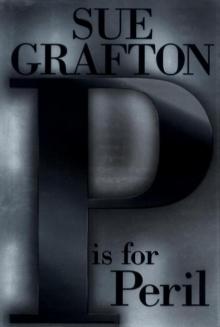 P Is for Peril
P Is for Peril R Is for Ricochet
R Is for Ricochet J Is for Judgment
J Is for Judgment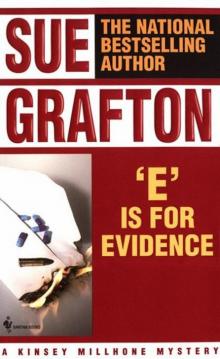 E Is for Evidence
E Is for Evidence T Is for Trespass
T Is for Trespass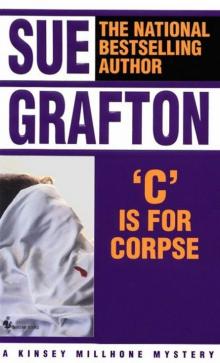 C Is for Corpse
C Is for Corpse U Is for Undertow
U Is for Undertow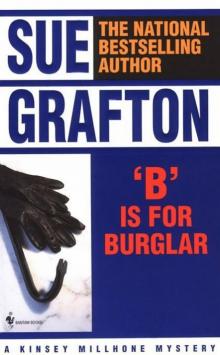 B Is for Burglar
B Is for Burglar Four Sue Grafton Novels
Four Sue Grafton Novels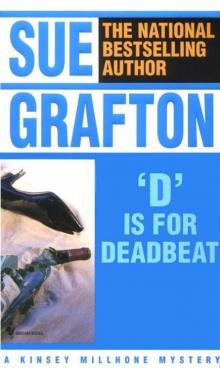 D Is for Deadbeat
D Is for Deadbeat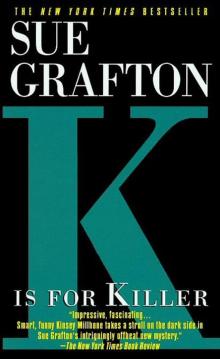 K Is for Killer
K Is for Killer I Is for Innocent
I Is for Innocent A Is for Alibi
A Is for Alibi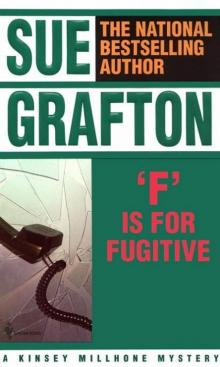 F Is for Fugitive
F Is for Fugitive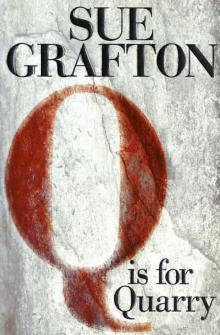 Q Is for Quarry
Q Is for Quarry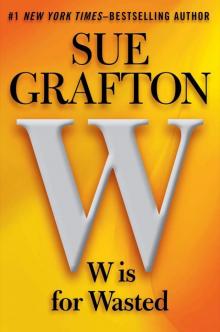 W Is for Wasted
W Is for Wasted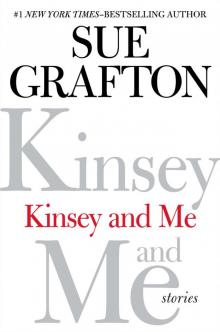 Kinsey and Me: Stories
Kinsey and Me: Stories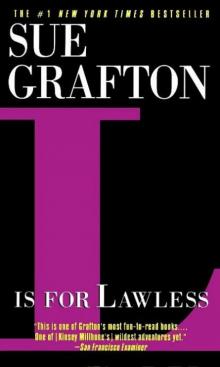 L Is for Lawless
L Is for Lawless Y Is for Yesterday
Y Is for Yesterday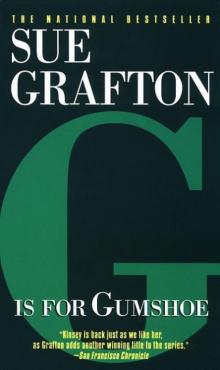 G Is for Gumshoe
G Is for Gumshoe O Is for Outlaw
O Is for Outlaw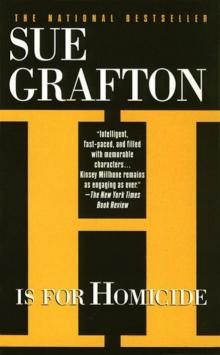 H Is for Homicide
H Is for Homicide X
X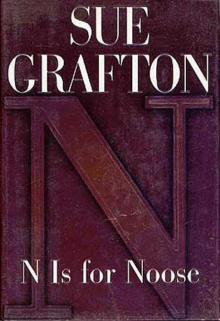 N Is for Noose
N Is for Noose Three Complete Novels: A Is for Alibi / B Is for Burglar / C Is for Corpse
Three Complete Novels: A Is for Alibi / B Is for Burglar / C Is for Corpse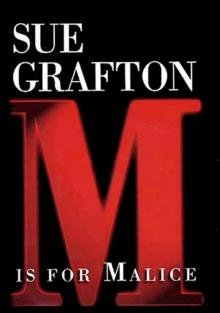 M Is for Malice
M Is for Malice I is for INNOCENT
I is for INNOCENT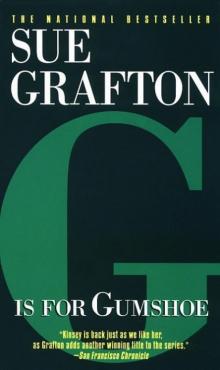 G is for GUMSHOE
G is for GUMSHOE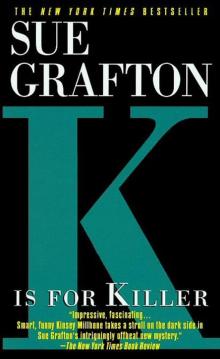 K is for KILLER
K is for KILLER S is for SILENCE
S is for SILENCE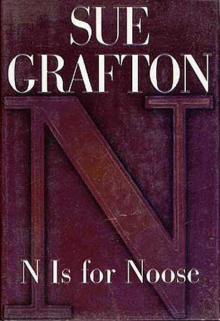 N is for NOOSE
N is for NOOSE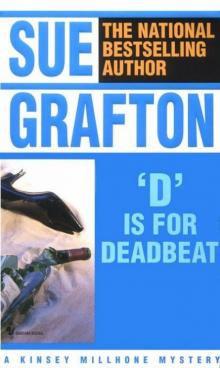 D is for DEADBEAT
D is for DEADBEAT V is for Vengeance
V is for Vengeance U is for Undertow
U is for Undertow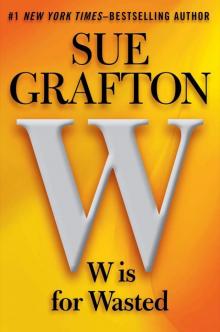 W Is for Wasted km-23
W Is for Wasted km-23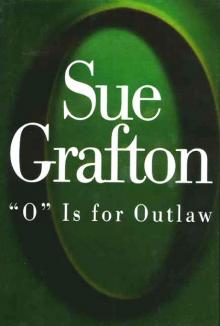 O is for OUTLAW
O is for OUTLAW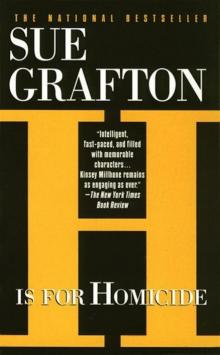 H is for HOMICIDE
H is for HOMICIDE Sue Grafton Novel Collection
Sue Grafton Novel Collection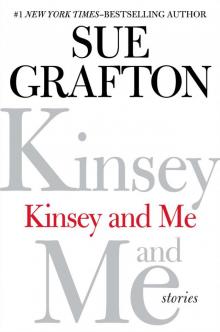 Kinsey and Me
Kinsey and Me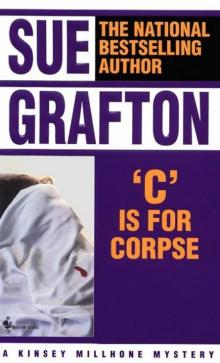 C is for CORPSE
C is for CORPSE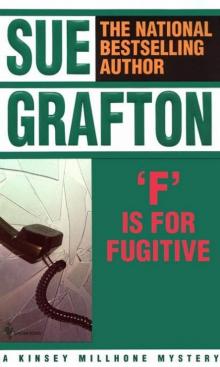 F is for FUGITIVE
F is for FUGITIVE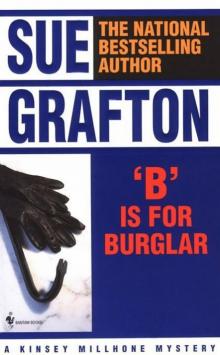 B is for BURGLAR
B is for BURGLAR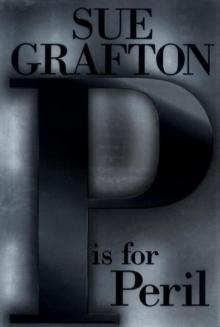 P is for PERIL
P is for PERIL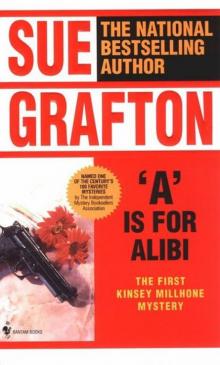 A is for ALIBI
A is for ALIBI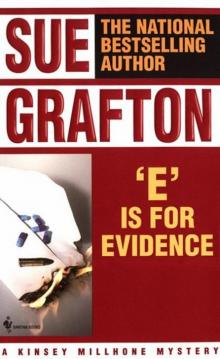 E is for EVIDENCE
E is for EVIDENCE J is for JUDGMENT
J is for JUDGMENT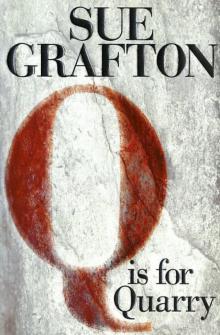 Q is for QUARRY
Q is for QUARRY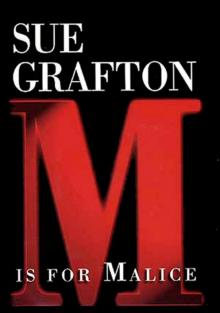 M is for MALICE
M is for MALICE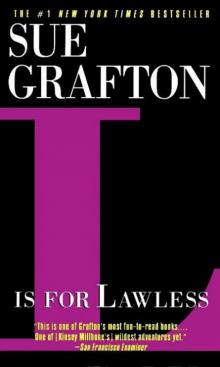 L is for LAWLESS
L is for LAWLESS